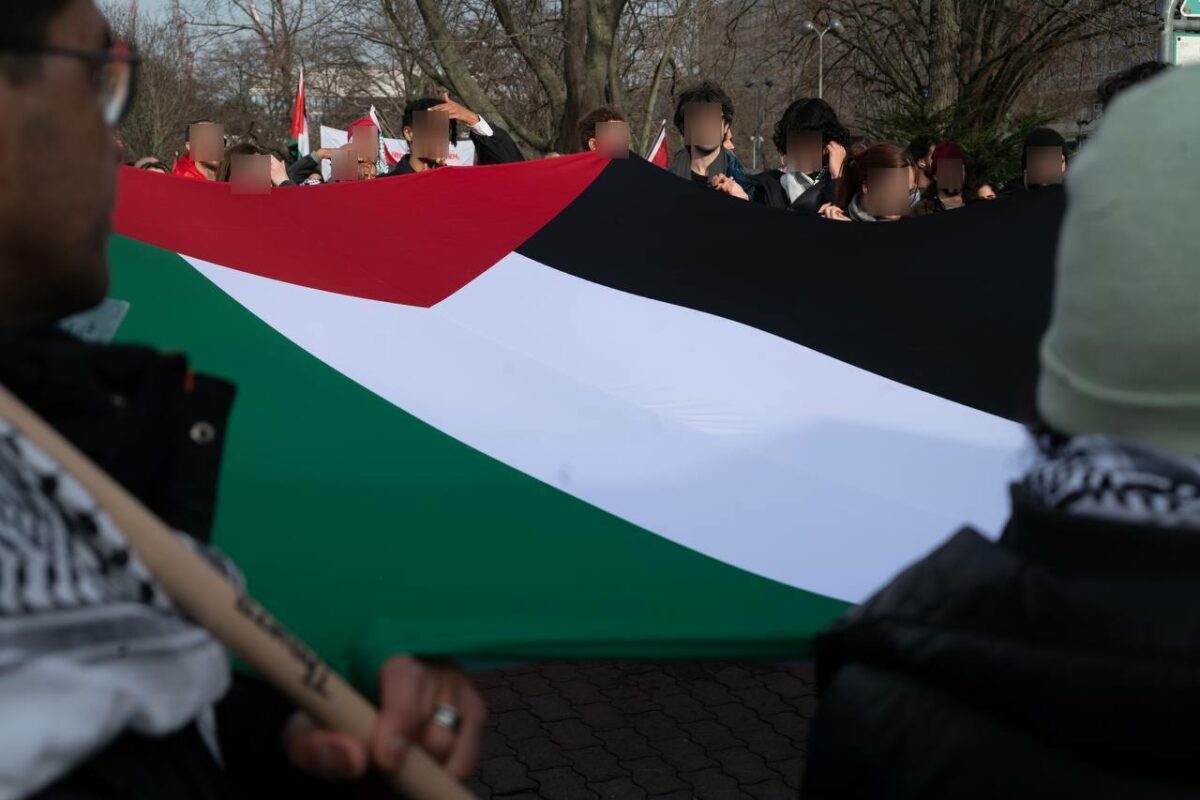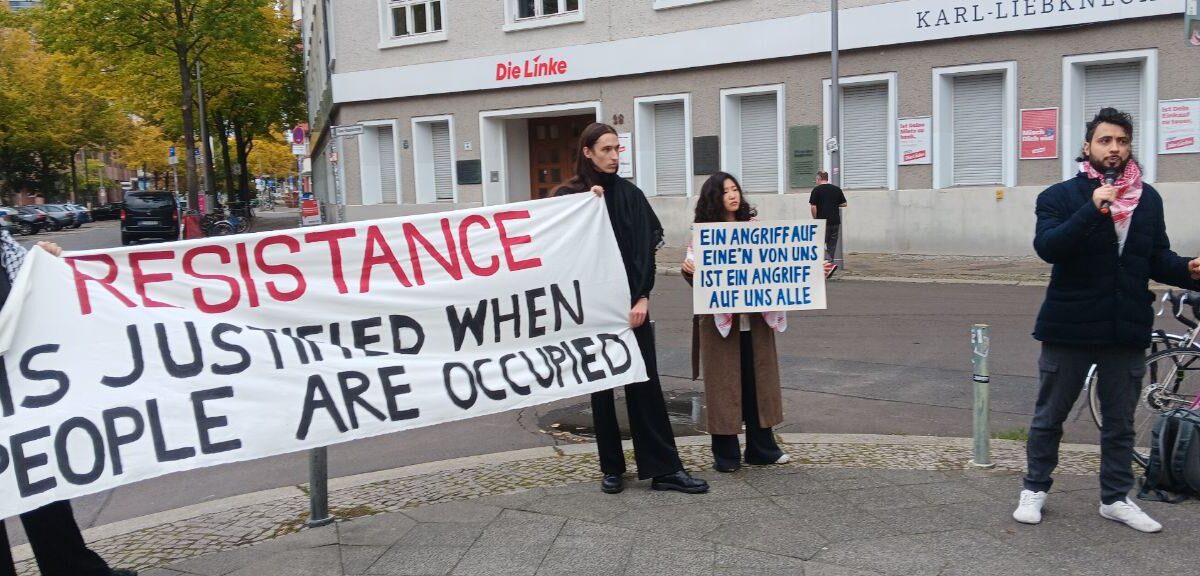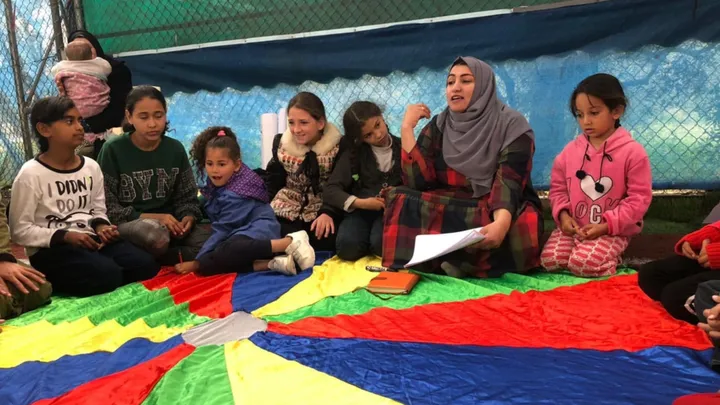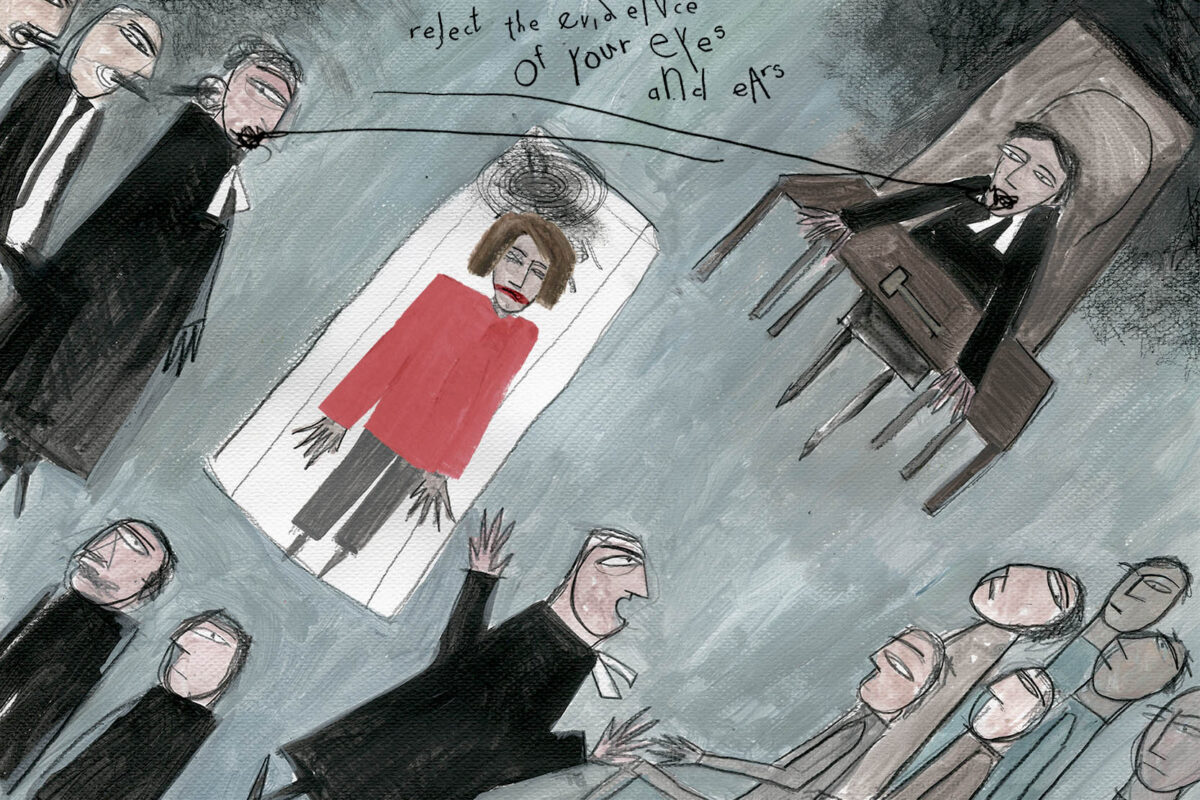7 October 2023 marked a turning point for many of us. My name is Itziar and I have lived in Berlin for two years. Since I arrived in Germany as a Catalan immigrant, of Jewish descent and committed to the Palestinian cause, I have witnessed the brutality, repression and censorship by the German state against its migrant population, at police, institutional and cultural levels.
To contextualize and explain why Germany (and its population) has a totally unconditional position of support towards the state of Israel, I will highlight a conversation I had the first week of arriving, with a new roommate. She was a sociology student and all afternoon we talked about feminism, antiracism, gentrification, queer movement, etc. Until I mentioned that I had been a member of the BDS (Boycott, Divestment and Sanctions in Israel) group of my university a few years ago. Her reaction was a pale face followed by a “Why?”. She wondered why I was a member of a group like the BDS after having been two hours talking about anti-colonialism. With some perplexity I explained to her that I, as a Jew, felt that I had the responsibility to contribute to the fight for the Palestinian cause. She replied “I know that my grandparents fought for the Nazis, and for this reason I cannot speak about this issue.” I thought “just you – more than anyone – should talk about it”.
This situation has been repeated time after time at work, and in social and political situations. The reflection I have is that Germany has not understood or overcome the Holocaust. The deeply racist structures of German society remain as valid as before. What has changed now is the political subject: if yesterday it was the Jews, today it is the Arabs. The identity policies of a so-called ‘left’ (more like progressive liberalism, than a true anti-fascist left) abandons a minority that does speak of Palestine and opposes the existence of the state of Israel.
In the first weeks after 7 October, the German state armed a massive institutional and media campaign to suppress the movement that emerged mainly from the Palestinian community. Germany is the European state with the most members of the Palestinian diaspora in Europe. During the first demonstrations responding to the bombings in Gaza, the Berlin police, illegally carried out a massive campaign of violent indiscriminate arrests. Targeting those wearing the Palestinian Kufiya, flew Palestinian flags or simply called out ‘Free Palestine’. Once the police even violently arrested a nine-month pregnant woman and pulled the hijab off another. Just a few of many cases of police violence. Another chant still banned today is “From the river to the sea Palestine will be free” where any individual shouting this slogan in public is automatically arrested. The pretext is they deny Israel’s existence which is therefore an antisemitic chant. Arrests were concentrated, during demonstrations, but also in the Neukolln neighbourhood in the Arab neighbourhood. The police presence continues to grow and patrol there to now.
In the initial demonstrations, the state also banned the existence of the Samidoun collective – categorized as a “terrorist organization”. The police carried out a coordinated attack, with the media present, of three of the social premises where various feminist and anti-racist groups meet. This included the much-loved Cafe Karanfil, a social coffee house especially by the Palestinian and migrant community, organize cultural and political activities. The attack took place during the early hours of the morning. These images circulated throughout Germany, reinforcing the Islamophobic and anti-Palestinian discourse.
The other sector in which the Arab community has suffered (and continues to suffer) systematic discrimination is the education sector. In schools there was a very strong wave of racism, perpetuated by both teachers and students. The state forbade students from carrying the Palestinian flag and the Kufiya in class, as symbols that ‘instil antisemitism’. Teachers were threatened with being firing if they did not adhere to the regulations or if they showed support for Palestine to pupils. This culminated in a teacher’s assault of a high school student with a Palestinian flag on their back, at a school in Neukolln. A few weeks later a girl was assaulted in the toilets of another high school outside Berlin, for carrying a chain around her neck under the name of Allah. The girl was taken to hospital in serious condition. In Wedding, a Muslim student was expelled from class for praying in silence in a corner of the classroom. Yet legislation dictates to have rooms to pray for students who want it. This school had previously been awarded as an educational institution committed to the anti-racist struggle.
Obviously, there was a strong response to this wave of discrimination, which strengthened the movement among students. However, on February 2, the police began another campaign of racism in schools. They presented themselves at the gates of schools to distribute flyers urging teachers and educators to call the police if hearing children and students state aloud that “Israel is committing a genocide”. This state-made steering of Zionist propaganda, includes how media lies when covering demonstrations or actions in solidarity in Palestine. It accuses protesters of antisemitism (although most of these calls are organized by Jewish groups among others). It empowers part of the German population to assault people in public space with complete impunity, simply for bringing a Kufiya or an adhesive of a watermelon.
With others, I was flyposting on the occupation in Palestine on the doors and walls of the street, when we were suddenly attacked by a man who came at us from behind running with the sheet in his hand. We had to hide in the subway, behind a column, to avoid aggression, while the man searched for us along the train platform. A friend was verbally and physically assaulted in a supermarket, by a couple claiming to be from Israel, shouting that the Kufiya he was carrying was a “threat to his existence” after pushing him through the corridor. And another colleague (also with a kufiya) was also assaulted by three people who took him by the jacket, broke the buttons and drove him out of the wagon pushing him while they called “auslander raus” (immigrants outside). These are just cases that I have witnessed or experienced first-hand. The story is repeated by every person involved in the movement for Palestine here in Berlin.
On 22 February, the President of Germany, Frank-Walter Steinmaier of the Social Democratic Party of Germany (SPD) met with the President of Israel, Isaac Herzog, to ensure more military and economic support for the Palestinian genocide. To prevent demonstrations to reject Herzog’s presence, the police fenced off the entire Tiergarten area. Tiergarten is a park converted into a memorial area for the victims of the Second World War. It is no coincidence that Germany invited the person responsible for a current genocide to broadcast live on TV, to meet in a space full of sculptures and memorials to honour the victims of Nazism. In this same concentration, which finally took place next to the park, one of the protesters leading the chants was arrested for shouting “Zionism is Fascism”.
Before this meeting, on 3 February, the state promoted a public day against the rise of the extreme right led by the AFD (Alternative für Deutschland) party, which took place in front of the Bundestag with hundreds of thousands of attendees. Some of the groups in solidarity with Palestine convened a block to have a presence and denounce the hypocrisy of parliamentary parties and self-called “left” sectors, in supporting Israel and silence the Palestinian voices within the anti-fascist movement. From the outset, the police banned Palestinian flags under the pretext of ‘you cannot show national flags’ (while Israeli flags with rainbows were flying unpunished). The Palestinian flag is not a national flag, but a symbol of indigenous and anti-racist resistance. One of the organizers of the block and recognized activist, Rachel Shapiro, of Jewish origin – suffered an assault by a German man. He spat in her face while accusing her of antisemitism. Is there anything more antisemitic than a German spitting at a Jewish person in the middle of 2023? At the end of the act I heard one protester talking to another saying, ‘I don’t understand why these people should come with Palestinian flags to the demonstration against the AFD’. This phrase seemed to me to be very conclusive of the problem with the German left.
This is an absolute tokenization of antisemitism, so obsessive as an excuse to expand their discourses of anti-Arab hatred and Islamophobic racism. I would like to highlight the slogan “Nie wieder ist jezts” (or ‘never again is now’) refering to the Holocaust. It is on the lips of the entire German population which is currently legitimizing the genocide against the Palestinian people. It has the aim of evading the historical responsibility that Germany has both for the crimes of Nazism, and for the participation in the foundation of the state of Israel. Germany is an imperial power interested in the geo-resources of Palestine, just as the United States, Great Britain and all the Western powers that continue to legitimize an illegal, genocidal, supremacist and fascist state.
Despite this, solidarity with Palestine has grown substantially since October 7. Street protests have gained ground, thanks also to international pressure and solidarity throughout Europe and other countries. Especially in the cultural context, where groups of artists and activists have coordinated a movement to publicly denounce all institutions giving voice to the Zionist narrative. These actions on occasion, resulted in institutional crisis, or being forced to rethink their pro-Israeli policies. For example, the Berlinale film festival, which at the request of the mayor of Berlin of the CDU (Union Christian Democrats of Germany) Kai Wegner, included representatives of the extreme right AFD in the program. These were disinvited because of protests. Later, Wegner criticized the speech of an Israeli filmmaker who called for equality with the Palestinians, which Wagner called antisemitism.
Another action was a performative activity at the Hamburger Bahnhof gallery which exposed the artist Tania Bruguera. The organisers of the action, Thawra and Palästina Spricht accused Bruguera of expressing “unconditional support for Israel” and of supporting a demand by the government in the state of Sachsen-Anhalt that applications for German citizenship must sign a loyalty oath to Israel (this demand has since been withdrawn).
As a final reflection I would like to emphasize two points: the first is to consider the Zionist ideology as something inherently antisemitic. This given the current context and witnessing how the German extreme right (and all other parties) silences, delegitimizes and attacks any Jewish voice critical of Israel. A radical opposition between Judaism and Zionism is needed. Zionism has stripped the Jewish identity and used it to carry out ethnic cleansing in the service of the West. Germany remains in the same historical role as it did 80 years ago. And the second is the relevance of organizing, being present at the demonstrations, talking about Palestine in our environments and always questioning racist discourses. The situation in Germany is critical but thanks to international solidarity our movement has been able to consolidate, grow and confront the state, the police and the dominant narrative. For this reason I encourage each and every reader of this article to participate in your local calls and continue with BDS, and thus strengthen the struggle for the liberation of Palestine and all the oppressed peoples of the world.
This article was originally published in Catalan in El Septembre




